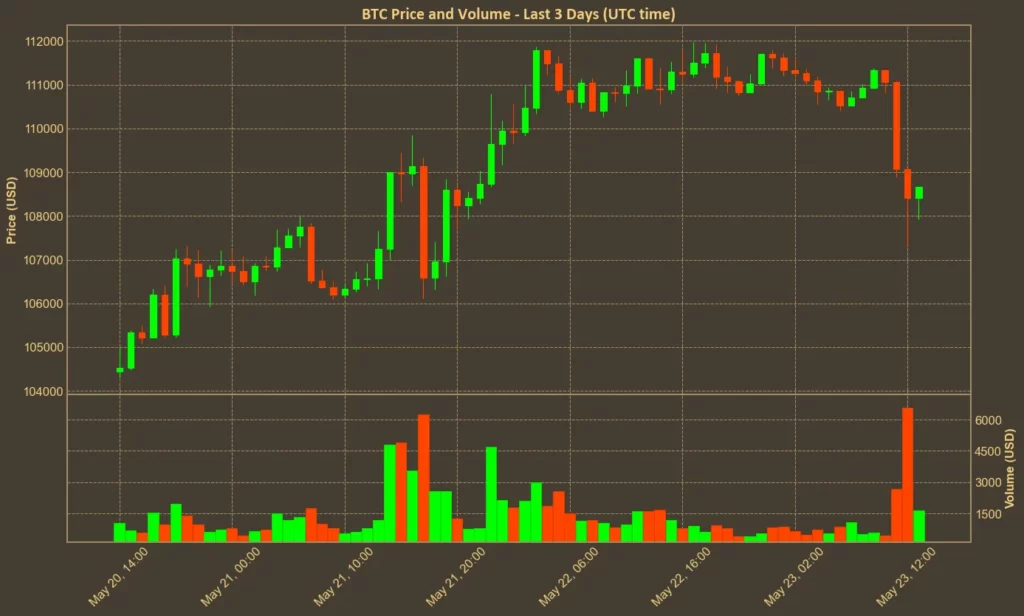Bitcoin fell to $108,000 on Friday following a series of new tariff announcements made by U.S. President Donald Trump. The digital asset had reached a new all-time high of nearly $112,000 the previous day but dropped sharply in today’s early trading. At the time of writing, Bitcoin is trading around $108,200, reflecting a decline of roughly 2.5% in 24 hours.

The drop likely resulted from two major developments. First, Trump stated that Apple would face a 25% tariff on iPhones not manufactured within the United States. Second, he proposed a 50% tariff on all goods imported from the European Union starting June 1. Both announcements were made via Truth Social.
Table of Contents
Tariffs and Market Impact
The proposed tariffs have caused significant volatility across financial markets. European stock indexes such as Germany’s DAX and France’s CAC lost more than 2% during Friday trading. U.S. stock futures also fell, with S&P 500 futures down approximately 1.5%.
Bitcoin’s decline follows broader risk-off sentiment triggered by concerns over potential trade disruptions and inflationary pressures. Other cryptocurrencies, including Ethereum and XRP, experienced similar declines. According to CoinGlass, total crypto liquidations exceeded $500 million in the past 24 hours, affecting nearly 160,000 traders.
Apple and Supply Chain Concerns
Trump’s statement specifically targeted Apple, warning that a 25% tariff would be imposed if iPhones sold in the U.S. are not manufactured domestically. Apple currently produces the majority of its iPhones in countries such as China and India. The company’s stock fell by 3.5% in premarket trading after the announcement.
It remains uncertain whether tariffs can be legally applied to individual companies. However, Apple is already planning to shift more production to India by 2026 in response to earlier tariffs imposed on Chinese imports.
EU Trade Relations and Retaliation Risks
In addition to the Apple comments, Trump criticized stalled trade talks with the EU and proposed a blanket 50% tariff on all EU imports starting June 1. The European Commission has not responded with a formal countermeasure but is reportedly considering retaliatory tariffs worth approximately $100 billion.
This announcement marked a sharp turn in U.S.-EU trade negotiations, which had previously included discussion of phased tariff reductions and joint initiatives in digital infrastructure, energy, and AI. Markets responded negatively, with the euro weakening and bond yields in the eurozone falling sharply.
Bitcoin’s Market Position and Investor Sentiment
Bitcoin had been on a strong upward trend in recent days, reaching record highs due to increasing institutional interest, inflows into U.S.-listed spot Bitcoin ETFs and weak dollar.
Friday’s price drop follows a familiar pattern where geopolitical or trade-related uncertainty prompts a broad reduction in exposure to risk assets. Despite this, Bitcoin remains within a relatively stable range, and current funding rates and on-chain metrics do not indicate significant long-term selling pressure.
Read also: [QUIZ] Crypto History: Test Your Knowledge!




